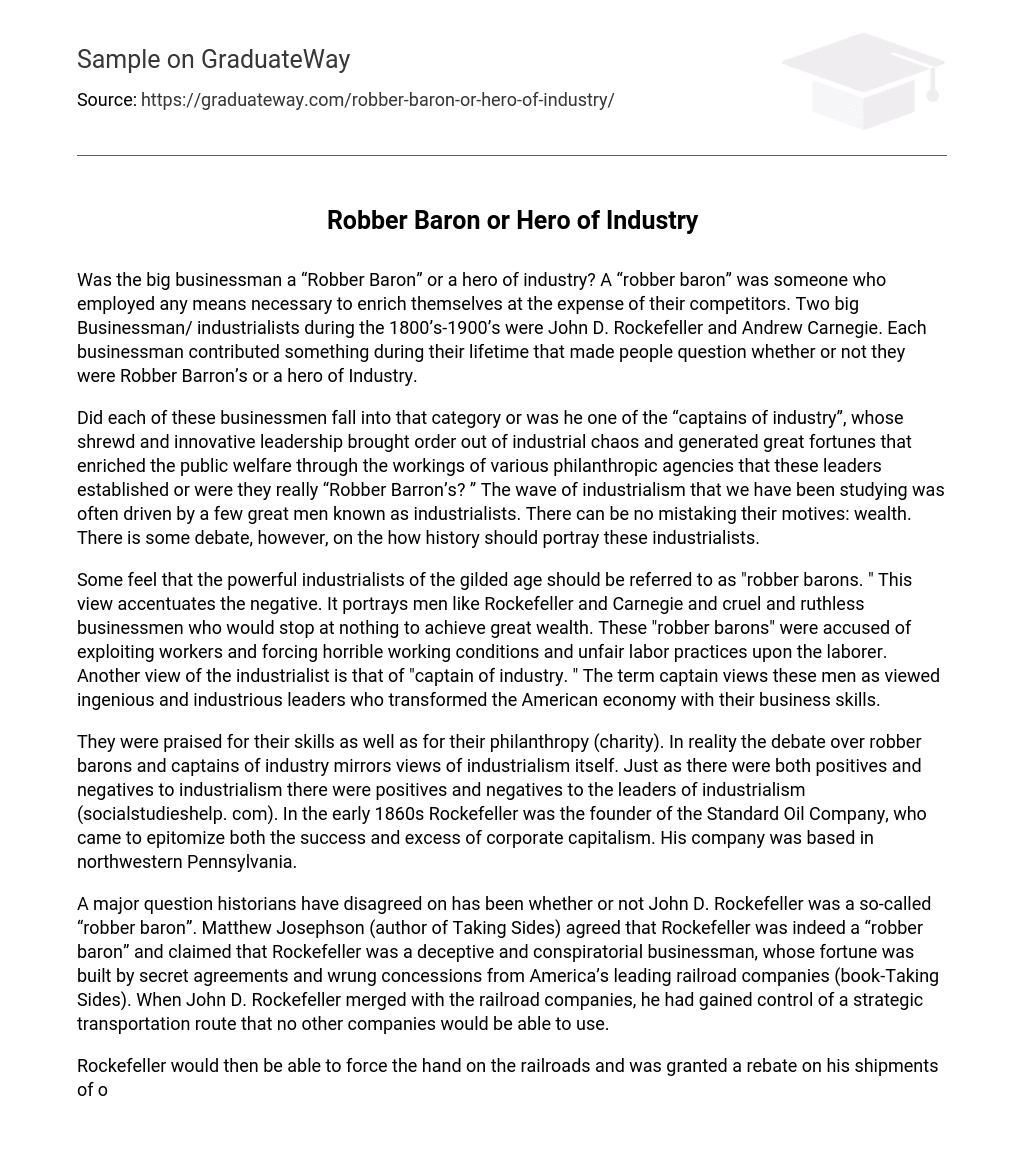Was the big businessman a “Robber Baron” or a hero of industry? A “robber baron” was someone who employed any means necessary to enrich themselves at the expense of their competitors. Two big Businessman/ industrialists during the 1800’s-1900’s were John D. Rockefeller and Andrew Carnegie. Each businessman contributed something during their lifetime that made people question whether or not they were Robber Barron’s or a hero of Industry.
Did each of these businessmen fall into that category or was he one of the “captains of industry”, whose shrewd and innovative leadership brought order out of industrial chaos and generated great fortunes that enriched the public welfare through the workings of various philanthropic agencies that these leaders established or were they really “Robber Barron’s? ” The wave of industrialism that we have been studying was often driven by a few great men known as industrialists. There can be no mistaking their motives: wealth. There is some debate, however, on the how history should portray these industrialists.
Some feel that the powerful industrialists of the gilded age should be referred to as “robber barons. ” This view accentuates the negative. It portrays men like Rockefeller and Carnegie and cruel and ruthless businessmen who would stop at nothing to achieve great wealth. These “robber barons” were accused of exploiting workers and forcing horrible working conditions and unfair labor practices upon the laborer. Another view of the industrialist is that of “captain of industry. ” The term captain views these men as viewed ingenious and industrious leaders who transformed the American economy with their business skills.
They were praised for their skills as well as for their philanthropy (charity). In reality the debate over robber barons and captains of industry mirrors views of industrialism itself. Just as there were both positives and negatives to industrialism there were positives and negatives to the leaders of industrialism (socialstudieshelp. com). In the early 1860s Rockefeller was the founder of the Standard Oil Company, who came to epitomize both the success and excess of corporate capitalism. His company was based in northwestern Pennsylvania.
A major question historians have disagreed on has been whether or not John D. Rockefeller was a so-called “robber baron”. Matthew Josephson (author of Taking Sides) agreed that Rockefeller was indeed a “robber baron” and claimed that Rockefeller was a deceptive and conspiratorial businessman, whose fortune was built by secret agreements and wrung concessions from America’s leading railroad companies (book-Taking Sides). When John D. Rockefeller merged with the railroad companies, he had gained control of a strategic transportation route that no other companies would be able to use.
Rockefeller would then be able to force the hand on the railroads and was granted a rebate on his shipments of oil. This was a kind of secret agreement between the two industries. None of the competition knew what the rates were for the rebates or the rates that Rockefeller was paying the railroad. This made it hard for the competition to keep up with the Standard Oil Company. The consequences led to many oil companies getting bought out by Rockefeller secretly. All in all, 25 companies surrendered to Rockefeller’s relentless expansion, which was 20% of the oil industry in America.
John D. Rockefeller and his comrades had stolen a long march on their 3 opponents; their tactics shaped themselves already as giant industrialists of the future conquering the pigmies. Josephson said, “Entrenched at the narrows of the mighty river of petroleum, they could no more be dislodged than those other barons, who had planted their castles along the Rhine” (u-s-history. com). Another businessman, Andrew Carnegie (1835-1919) led the enormous expansion of the American steel industry in the late nineteenth century and became the archetypal industrial entrepreneur.
Carnegie set a model for big business and industry as an early and enthusiastic adopter of new technologies. After touring Europe and seeing the Bessemer blast furnace that had revolutionized British steelmaking, Carnegie pioneered the American use of the technology at his Braddock, Pennsylvania steel works in the 1870s. This established the model on which Carnegie built his empire. He was among the first to implement the open-hearth steelmaking process later in the century. Still, Carnegie was regarded as an innovator in his own right for his ingenious, if ruthless, cost-cutting production and organizational strategies.
These assets made him both famous as one of the world’s wealthiest men, and infamous as a central figure in the era’s labor struggles (pbs. org). In the early 1900s, in order to maintain control of the steel industry, Andrew Carnegie bought out rival plants, he ran a self running holding company which bought stock in itself in order to buy control of the industry, and he also hired children (as young as 9 years old) to work twelve hours a day under harsh, dangerous conditions and paid them the lowest wages possible.
Even though he did all this people considered him our American Hero! Carnegie did, for a fact, hire children because they were cheaper; yet these same children were sometimes required to run swing shifts which meant occasional 24 hour work days. It all too much of a commonality that these robber barons all share some of the same traits: ruthlessness, mistreatment of their workers, greed for money and power, and a deceitful way of doing business.
Yet with all that said people still feel that he was a hero of industry, while it sounds that he is a Robber Baron (pbs. org). Both Andrew Carnegie and John D. Rockefeller achieved much in their lifetime that people came to think that they were captains of industry. I on the other hand see just the opposite. Yes they might have contributed a lot to the industry but the way they handled it all, in a sneaky and cunning manner, showed there true colors and portrayed that they were in fact Robber Barons.





